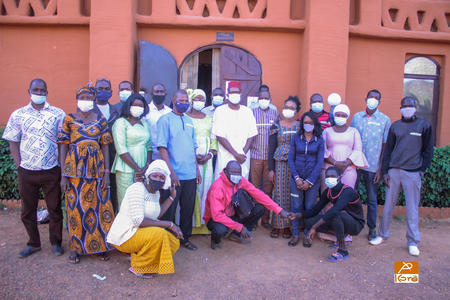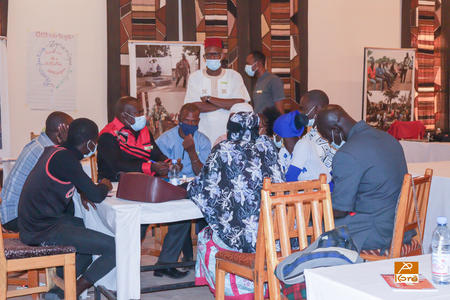The Conrad N. Hilton Foundation and One Drop Foundation support WaterAid in transforming lives in two districts in Mali by improving access to clean water and sanitation in healthcare facilities and communities.
This four-year project is called "Beseya Blon" and uses health centers as entry points to respond to the systemic causes of poor access to water, sanitation, and hygiene services in Bla (Segou Region) and Kati (Koulikoro Region). WaterAid collaborates with governments and local partners to strengthen systems, foster good hygiene practices, improve accountability and engage citizens.
We expect to reach 39,500 people with sustainable and inclusive access to clean water, 47,000 people with access to basic sanitation and 41,000 people with improved hygiene.
In 2020. WaterAid and partners developed the project and responded to COVID-19 with the Ministry of Health and Social Affairs in Mali. During the first six months of 2021, WaterAid and partners coordinated activities and refined the project workplan, establishing a strong foundation for successful implementation.
Project Virtual Launch
On March 11, 2021, the One Drop Foundation, Conrad N. Hilton Foundation and WaterAid virtually launched the Beseya Blon Project with the Centre Culturel Kôrè, World Health Organization, and Center for Disease Control and Prevention. The WHO facilitated the virtual launch, which included presentations from project partners about sustainable services in health centers, replicating project activities and involving the water sector in Mali. The Ministry of Health's representative formally launched the project and believes it will strengthen previous water, sanitation and hygiene efforts and reach areas currently lacking access.
Project launch in Mali
WaterAid and local partners in Mali organized project meetings in Neguelabougou (Bossofala Commune, Kati Circle), Diaramana (Diaramana Commune, Bla Circle) and Bla (Bla Circle). These meetings ensured local project ownership and clarified roles and responsibilities. Local authority representatives, community members, and water service providers attended meetings and committed to the project's success.
Click here to watch a video about the project launch in Diaramana.
Current project activities
WaterAid and local partners organized a workshop to plan intervention strategies aligned with national and local contexts. We signed agreements with the twelve communes and 16 local Community Health Associations. In addition, we set up Communal Management Committees to monitor project activities in each commune.
The project team identified the needs of each commune to develop economic, social and cultural development plans. The project team also assessed the current WASH conditions in eight health centers and developed plans with the Regional Directorate for Health in Segou. These plans will support future assessments of WASH improvements in healthcare.
The Beseya Blon Project will also reduce inequalities between men and women in accessing and governing services. WaterAid organized a gender and social inclusion workshop to strengthen women's roles in decision-making. We also established five women's coordination groups to empower women economically and promote local initiatives in Touna, Diédala, Bossofa, Samabogo and Nampasso health areas.
Focus activity: a dynamic learning workshop
Centre Culturel Kore organized a workshop to engage health centers and community actors in Social Arts for Behavior Change™. Through this process, participants identified the motivators and barriers to hygiene behavior, including the following:
- Mothers wash their hands with soap before feeding their children and eating.
- Children ages 6 to 18 use family latrines.
- Healthcare staff wash their hands with soap before and after seeing patients.
- Frontline health staff clean spaces and beds after each use.
Together, partners shared knowledge, engaged local communities and collected key information on the local cultural, psychological and economic context.
Celebration of World Water Day
To mark World Water Day 2021, WaterAid released the report: "Turn the Tide: The state of the world's water." This report highlighted the devastating effects of climate change on water resources and how they disproportionately affect the world's poorest people. With the current climate scenario, water scarcity will displace up to 700 million people by 2030.
WaterAid Mali Country Director Mamadou D. Diallo's spoke about the reposrt, drawing the government's attention to the impact of climate change on vulnerable communities' access to water.















